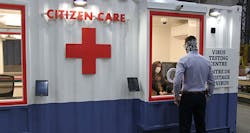PCL Construction rolls out portable coronavirus testing centers
By John Caulfield, Senior Editor
Most public health experts continue to insist that there’s no way of knowing how many Americans are infected by the novel coronavirus without extensive testing, which has been easier said than done given the limited number of manufacturers that make testing equipment and a still-unreliable supply chain, especially for chemical reagents.
The total number of public health labs that have completed verification and offer testing was 97, as of April 25, according to the Centers for Disease Control and Prevention (CDC). As of April 21, the website goodrx.com listed 670 drive-through testing sites nationwide, including 19 at Walgreens drug stores in 11 states. Walmart’s goal is to support up to 50 testing sites across the country. Apple recently added coronavirus testing locations to its Maps app for iPhone, according to the website CNET. As of the afternoon of April 26, CNN reported that, since January, health experts identified 963,168 confirmed COVID-19 cases in the United States, and 54,614 virus-related deaths, based on estimates from Johns Hopkins University Center for Systems Science and Engineering.
To bolster this testing effort, PCL Construction was part of an multidisciplinry team that developed mobile testing facilities that can screen employees and customers for COVID-19. These Citizen Care Pods, as they're called, are designed to serve end users such as manufacturing factories, office towers, and retail stores, according to the Minneapolis-based website Finance & Commerce, which reported on the prototype.
PCL, which is based in Edmonton, Alberta, has 31 offices in North America and modular manufacturing facilities in Bakersfield, Calif., Lake Charles, La., Houston, and Toronto.
Portable Virus Testing Centers help battle coronavirus
The Citizen Care Pods allow health professionals to conduct tests at a safe distance from the business establishment. For example, in Minnesota the mobile testing center is a 160-sf retrofitted prefab structure with ceiling heights that range from 8 feet to 9.6 feet. The testing center are available in two design options—walk-ups and drive-throughs—and can also be fitted out with security cameras, sensors, and digital communications equipment.
The Daily Journal of Commerce reports that PCL’s testing centers were developed from prefabricated Conex units, similar to ocean shipping containers. The walk-up boxes have up to four stations inside that separate healthcare workers from people being tested. There are two windows on each side of the box, and two collapsible canopies that double as shelter when people are being tested and as protection with the box is shipped.
Modules have one swing door at the end for workers to enter and exit. Inside, there is a hand wash station, biohazard waste bin, metal shelving/cabinets, counters, a water cooler, electrical panel, a computer rack/communications panel and space for an optional battery. Hand sanitizer dispensers are found outside each window.
ALSO SEE: COVID-19 and real estate: How the coronavirus is impacting the AEC industry
Drive-thru units are similar to the walk-up units, except there is only one window on each side.
The development team for this concept was led by Citizen Care Pods Corporation, WZMH Architects, and PCL Construction. The team collaborated with LIfeLabs, Microsoft, and Insight Enterprises to bring this concept to completion in less than a month. Microsoft is investigating whether artificial intelligence could be deployed to eliminate the human element from the testing centers.
Ben Reinhardsen, who manages PCL’s special projects division, told the Journal that an order could be turned around and installed within three weeks.
The rollout reportedly will include a half-size option. As of this week, the team is finalizing details and pricing for an official launch of the pods.
